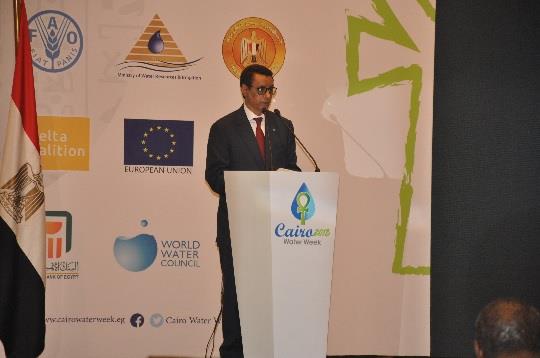Water Scarcity is at the top of Cairo Water Week Agenda

FAO Assistant Director-General and Regional Representative speaking at the opening ceremony of Cairo Water Week
14 October 2018, Cairo -- Water scarcity is one of the most urgent food security issues facing countries of the Near East and North Africa (NENA), with fresh water availability in the region expected to drop by 50 percent by the year 2050, the Food and Agriculture Organization of the United Nations (FAO) said today at the opening ceremony of Cairo Water Week (CWW).
The opening ceremony was a platform for around 20 Ministers and more than 40 international delegations from across the world. His Excellency Mustafa Madbouli, Prime Minister of Egypt, Mr. Mohamed Abdel Aty, Egyptian Minister of Water Resources and Irrigation, Loïc Fauchon, Honorary President of the World Water Council and President of the Société des Eaux de Marseille and the Deputy Secretary General of the United Nations attended the opening ceremony.
Egypt’s first Cairo Water Week is held under the auspices of President Abdel Fatah al-Sisi, aiming at increasing the public awareness of water rationalization for the sustainable development amid state of water shortage.
The Ministry of Water Resources and Irrigation organizes the four-day event in collaboration with the FAO and the European Union to tackle water issues, amid climate change that affects the world’s freshwater.
The main them of the CWW is “Water Conservation for Sustainable Development”. It aims at fostering awareness of water issues for sustainable development, facing water challenges via non-traditional methods and modern technology, and supporting implementation of integrated water management.
Speaking at the opening ceremony of the Egypt’s first Cairo Water Week, Abdessalam Ould Ahmed, FAO Assistant Director General and Regional Representative for the Near East and North Africa, said “Agriculture must be central to our responses to the challenge of water scarcity in the Region. Agriculture is by far the largest user of water in the region, but it is also fundamental to our survival and long-term resilience,"
"The region has made significant strides in two decades in developing its water usage and storage capacities, but there is still much work to be done to improve water efficiency in agriculture, protect water quality, and address challenges related to climate change," Ould Ahmed added.
The CWW focuses on the following themes: climate change and environment; transboundary water governance and benefits; Water, scarcity, health, Sanitation challenges and opportunities; and science and technology innovations.
